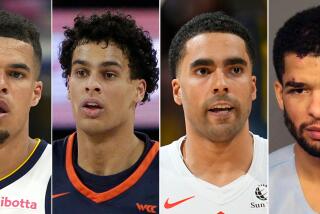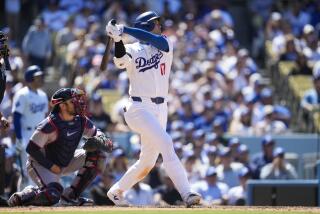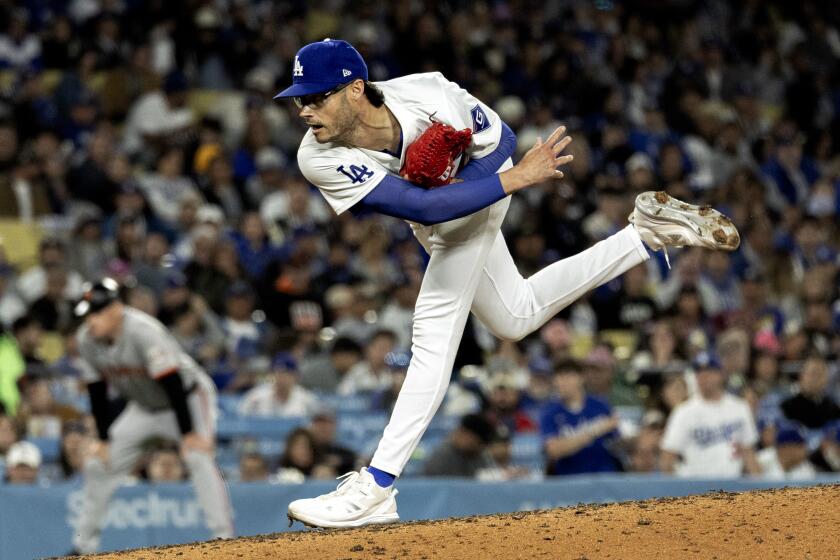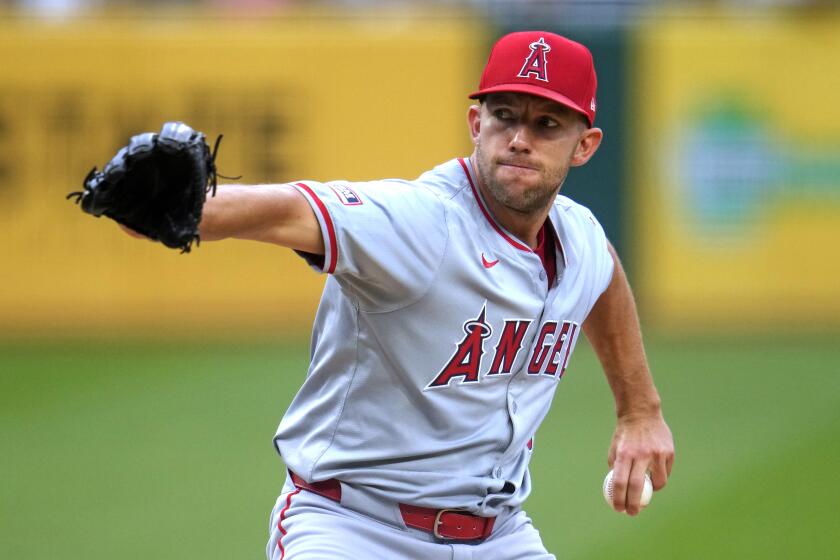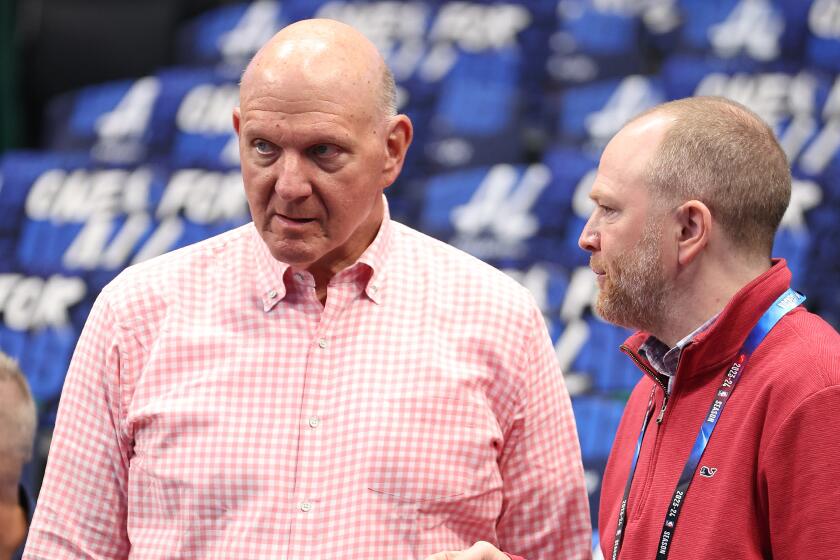DOYLE’S MARCH : Alexander’s Baseball Career Gives an Entirely New Meaning to the Term ‘Journeyman’
It’s another homecoming for pitcher Doyle Alexander, who’s had so many he can’t count them without NASA’s computer. Let’s keep it simple: If it’s Thursday, he must be pitching against his old teammates, the Dodgers.
He came up with them back in ‘71, when he was 20 and innocent. They cured him of that by trading him in half a season to Baltimore.
Next up will be his old teammates, the Giants. Never can forget those guys, either. He lasted a whole season in San Francisco.
He forced the trade that sent him there in ’81 by refusing to report to spring training with the Atlanta Braves, went 11-7 and then refused to go to spring training with the Giants, too. Maybe he didn’t like calisthenics?
One thing was certain, his innocence was a long way behind him.
All in all, there haven’t been a lot of careers like this one, featuring 164 victories, 6 trades, 1 release and 2 free-agent signings.
“Other than the first time I was traded, I’ve had a hand in every move I’ve made,” said the ex-Dodger, ex-Oriole, ex-Yankee (twice), ex-Ranger, ex-Giant and ex-Blue Jay, now in his second stint as a Brave.
“It all goes back to one thing. I wanted to play. If they were not going to play me, or pay me, I’d ask them to trade me.
“I’ve been a free agent. I’ve sat at home and refused to report until I was traded.”
Sometimes it has worked out better than others. He sat out last winter as one of the unbid-upon free agents. He sat out the spring, too, until May 26. Most of the other guys went back to work May 1, for offers comparable to those they had received in January.
Alexander, who turned down a $2.3-million, two-year deal, took a little cut--to $1.3 million. That’s assuming he makes all his incentive clauses. And the second year is at the club’s option.
“Regrets?” Alexander said. “No.”
Hard feelings? Well . . .
“I don’t know if you’d call it hard feelings but I was treated different than all the other free agents,” he said. “I was the fall guy. Whether it was pre-planned or not.
“If I thought about the way I was treated this winter, there’d be no way I could pitch. But when I’m on the mound, I’m not concerned with anything but pitching.
“That was only a battle. The war’s not over.”
There is a grievance hearing now going on that he follows closely. Teed off, forced to come back on management’s terms, can he be in any mood to pitch?
Well, yes. In less than a month, he has a 4-1 record. His earned-run average is 3.26, or 1.20 lower than the next-best Brave starter’s. He may not be the easiest man to sign, but he isn’t the easiest to beat, either.
Unfortunately for him, he isn’t he most impressive-looking, either. He doesn’t throw 95 m.p.h., or 90, or even 85 anymore. He just gets people out. People have always tended to look at him and say, “Long relief.” Alexander has always tended to insist they were wrong.
“You talk about a guy who wanted to beat you,” said Tom Lasorda, who managed Alexander at Spokane. “He was tough. He was quiet and introverted but, buddy, when he got out on that mound, he was tough. That’s why he’s pitched so long.”
So what if the Dodgers preferred rookies who might be the next coming of Koufax?
“I found out pretty quick what it was like,” Alexander said. “I signed with the Dodgers at 17. At 20, I was in the big leagues pitching for ‘em. I guess at that point, I was one of their top young pitchers. That winter, I was in the trade for Frank Robinson.”
Alexander got to be in a lot of famous deals. Five years later, he went to the Yankees in the one for Scott McGregor, Rick Dempsey, Tippy Martinez and Rudy May that made the Orioles contenders for half a decade.
“Doyle was very unhappy with the Orioles, with the way Earl Weaver was using him,” said Oriole General Manager Hank Peters from Baltimore. “And he was very vocal in the clubhouse about it.
“Stubborn? He was then. I don’t know what he’s like now, but his reputation at that point was one of not being a very happy person.
“He and Ken Holtzman were kind of buddies. So we were very happy to deal them both.”
Said Alexander: “I came into a pretty strong pitching situation when I went over there in ’72. In ‘71, they’d had four 20-game winners. The following year, they traded Pat Dobson to make room for me to start. I went 12-8 with 40 days on the disabled list and we won the pennant.
“But something happened that winter. They didn’t want to pay me. We’re not talking big dollars. All I wanted was the same raise I’d gotten the year before, when I was 6-8. We’re talking $5-10,000. Back then, it made a big difference in your salary.
“So they traded for Ross Grimsley and I went back into middle relief.”
New York was fine, the first time around. He went 10-5 in half a season, but didn’t stick around. He says he got to start only by accident. “It was the day that Bowie Kuhn voided the Vida Blue deal.”
Fearing that the commissioner couldn’t strike down enough transactions to keep him in the rotation, he free-agented his way to Texas. Then asked for the trade to Atlanta. Ditto to San Francisco. Ditto to the Yankees again.
He returned to New York with a four-year, $2.2-million contract. He started poorly and broke his right hand, punching a dugout wall in Seattle. He went to Triple-A Columbus to get back in shape but refused to pitch a second outing.
He was blasted by Yankee owner George Steinbrenner and, when Steinbrenner wasn’t able to attend, lower officials. When Alexander was raked in his first start after returning from Columbus, Bill Bergesch, then in the Yankee front office, termed his performance “disgraceful . . . typical of the selfish attitude of the modern-day ballplayers . . . lousy.”
A year later, the Yankees released him. The Blue Jays picked him up, paid him the minimum salary, with the Yankees making up the balance of the $550,000 owed him annually, and watched as Alexander posted seasons of 7-6, 17-6 and 17-10.
“(Steinbrenner) was paying me when I beat the Yankees to clinch the division in ‘84,” Alexander said. “Toronto got 41 wins out of me on George’s salary. I was 41-22--after I was done.”
When George’s money ran out, problems set in. Alexander asked the Blue Jays for a contract extension last season, was denied and asked to be traded. Back to Atlanta.
“You have to learn to stand up,” Alexander said. “You find out once you’ve been around baseball, you’ve got to treat negotiations as business. Because (the owners) always have.
“It’s fun to play baseball in high school. You go into professional baseball, it’s a business.
“I’m not a high-ego person. I’ve never had that type of ability. Even when I was young, when I threw harder than what I do now, I still wasn’t at the top of the class. I was drafted back in the 44th round. I knew there’d been scouts around but I knew they weren’t overwhelmed by anything I’d done.
“There’ve been times when people told me I was through. I didn’t believe it. When I’m done, I’ll stop fighting. Until I do, I’ll still be out there fighting.”
He and his wife, Pat, his childhood sweetheart from Alabama, and their two children have settled in Arlington, Tex. Every place else is just, well . . .
“I’m not the type to go back to places I’ve lived and say, ‘Look how it’s changed,’ Alexander said. “I do that when I go back to Alabama.
“For me, the places we live in summertime, that’s a temporary residence.”
More to Read
Get our high school sports newsletter
Prep Rally is devoted to the SoCal high school sports experience, bringing you scores, stories and a behind-the-scenes look at what makes prep sports so popular.
You may occasionally receive promotional content from the Los Angeles Times.

